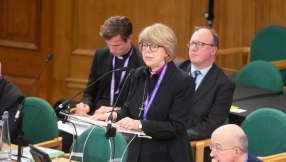Today, a solar eclipse looms for North America: the moon will pass in front of the sun, shrouding the land in darkness. With political turmoil and natural disasters seeming to abound now more than ever, some have imbued the eclipse with apocalyptic significance, perhaps seeing it as a 'sign of the times' – or perhaps just bored and wanting something to talk about in August.
One comedic petrol station sign in Seattle, captured on Twitter, riffed on the political possibility of the eclipse being a sign from the divine: 'Dear Lord is it time to impeach? Give us a sign – blot out the sun.'
Scripture too contains references to the celestial movements of darkness and light – and our capacity to become obsessed by them. But from where has humanity's fixation with reading the stars come from? Why does anyone care about a solar eclipse – and should Christians care today?
Looking up
'Looking up' has always come naturally to humanity, and it's understandable. What were we to make of the heavens, centuries before anything resembling the modern telescope emerged, allowing us to actually observe and understand outer space? Some saw the lights above and turned to worship, seeing the sun and moon as powerful deities to whom sacrifices must be made. Astrologers, as some still do today, saw the stars of our galaxy and interpreted – and predicted – human events accordingly.
Scripture maintains a fascination with the heavens, with an important distinction. Genesis 1:14 details how God created 'two great lights' in the sky, one for night, one for day. To those who worshipped sun and moon – here they saw a God who apparently stood above them. Other biblical moments are worthy of note: the book of Joshua sees God intervene to hold the sun in the sky, keeping the daylight to help the Israelites in battle, while Matthew's Magi followed a star to the birth of Christ.
As Christian Today's Mark Woods has explained in Does the Bible Really Say That?, Scripture challenges its ancient readers not to see the stars as their gods to bow down to, but simply useful gifts that glorify the creator, who alone should be worshipped. He wrote: 'All this tells us that we can live free from fear. Our lives are not controlled by the stars. We are not at the mercy of powerful gods and goddesses. Everything we see is made by the same hand, and while not everything goes right for us, it isn't because the gods are angry.'
Fringe fanatics?
It's sage advice for the fringe fanatics who occasionally make news with their predictions of imminent doom when eclipses and such occur. They may not worship the heavens, but they surely give them more credit than they're worth. As Ed Stetzer explained for Christianity Today, those Christian 'leaders' really are an obscure minority, often picked out only because they'll make a quirky headline. As far as can be seen, there are few serious leaders in contemporary mainstream Christianity fretting about today's celestial coincidence.
Nonetheless, aptly named websites like Signs of the End Times prove an exception to the rule, and avidly list how various events, including 'celestial signs', mark the 'end times' that Jesus warned of.
Anne Graham Lotz, daughter of famed evangelist Billy Graham, also suggested the eclipse was a sign. 'While no one can know for sure if judgment is coming on America, it does seem that God is signalling us about something,' she wrote, according to HuffPost. 'Time will tell what that something is.'
Christian radio host Bryan Fischer said today's event 'is a metaphor, or a sign, of the work of the Prince of Darkness in obscuring the light of God's truth'.
And to be fair, Jesus did say in Matthew 24:29 that 'Immediately after the tribulation of those days shall the sun be darkened and the moon shall not give her light, and the stars shall fall from heaven, and the powers of the heavens shall be shaken.' Revelation warns of a blackened sun and blood moons (Revelation 6:12-13) in the end times.
Stetzer agrees that yes, 'signs' will come when Jesus does come, but it will be undeniable. And, he says, the whole notion of apocalyptic countdown clocks is absurd since Jesus was clear that no one could ever know the hour in which he would return. So when theologically minded theorists raise their voices in this way, it often just looks silly, contradicts Christ, and when the world doesn't end (it hasn't yet) it makes a mockery of the faith.
As we've seen Scripture, read seriously, doesn't invite hysterical stargazing for figuring out the future. The stars light up the night, they incite wonder – but don't need to be worshipped or obsessed over. The cycles of the moon have been inspirational for human calendars (and biblical festivals), and the occasional eclipse at the very least provides some August excitement and heavenly drama.
But it's still just a big rock.
You can follow @JosephHartropp on Twitter













